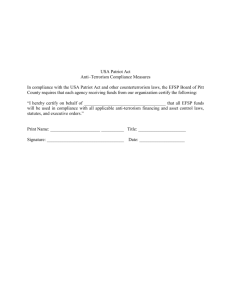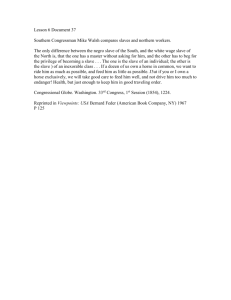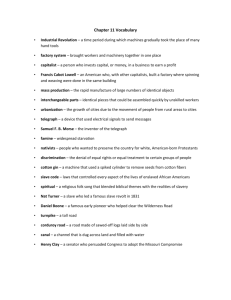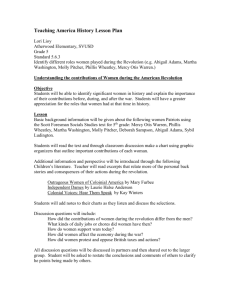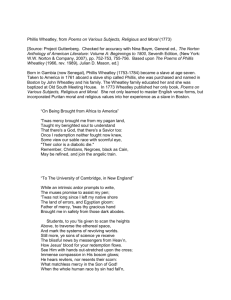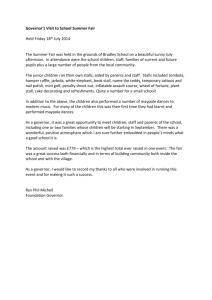Choice Sheet Notes - Unheard-Voices
advertisement
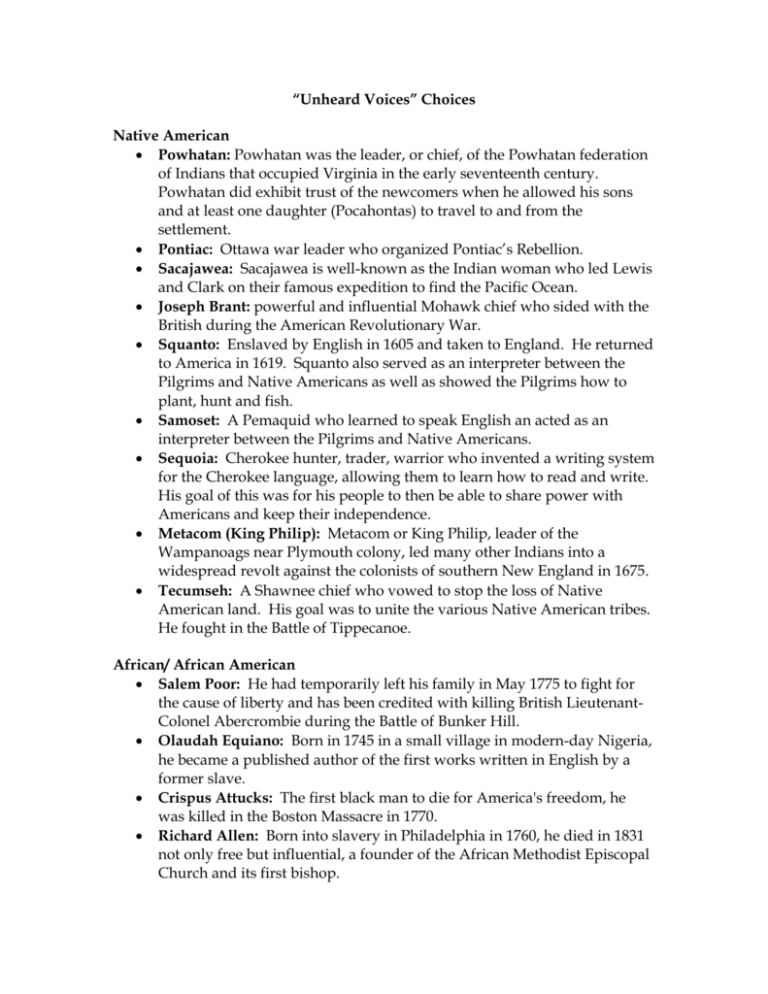
“Unheard Voices” Choices Native American Powhatan: Powhatan was the leader, or chief, of the Powhatan federation of Indians that occupied Virginia in the early seventeenth century. Powhatan did exhibit trust of the newcomers when he allowed his sons and at least one daughter (Pocahontas) to travel to and from the settlement. Pontiac: Ottawa war leader who organized Pontiac’s Rebellion. Sacajawea: Sacajawea is well-known as the Indian woman who led Lewis and Clark on their famous expedition to find the Pacific Ocean. Joseph Brant: powerful and influential Mohawk chief who sided with the British during the American Revolutionary War. Squanto: Enslaved by English in 1605 and taken to England. He returned to America in 1619. Squanto also served as an interpreter between the Pilgrims and Native Americans as well as showed the Pilgrims how to plant, hunt and fish. Samoset: A Pemaquid who learned to speak English an acted as an interpreter between the Pilgrims and Native Americans. Sequoia: Cherokee hunter, trader, warrior who invented a writing system for the Cherokee language, allowing them to learn how to read and write. His goal of this was for his people to then be able to share power with Americans and keep their independence. Metacom (King Philip): Metacom or King Philip, leader of the Wampanoags near Plymouth colony, led many other Indians into a widespread revolt against the colonists of southern New England in 1675. Tecumseh: A Shawnee chief who vowed to stop the loss of Native American land. His goal was to unite the various Native American tribes. He fought in the Battle of Tippecanoe. African/ African American Salem Poor: He had temporarily left his family in May 1775 to fight for the cause of liberty and has been credited with killing British LieutenantColonel Abercrombie during the Battle of Bunker Hill. Olaudah Equiano: Born in 1745 in a small village in modern-day Nigeria, he became a published author of the first works written in English by a former slave. Crispus Attucks: The first black man to die for America's freedom, he was killed in the Boston Massacre in 1770. Richard Allen: Born into slavery in Philadelphia in 1760, he died in 1831 not only free but influential, a founder of the African Methodist Episcopal Church and its first bishop. Mammy Kate: House slave of Stephen Heard, governor of Georgia, who rescued her master from prison. James Forten: free Black man in Philadelphia who became famous for his inventions. Benjamin Banneker: A free African American farmer who helped to lay out the boundaries of the nation’s capital. Women Eliza Lucas: First important agriculturalist of the United States who married Charles Pinckney. Abigail Adams: A women’s rights advocate and first lady. Anne Hutchinson: Believed in the rights of the individual to freedom of thought, freedom of speech, and freedom to worship. Also a wife, mother, religious leader, and perhaps the first American feminist. Deborah Sampson: First known American woman to impersonate a man in order to join the army and take part in combat. Sampson traveled throughout New England and New York giving lectures on her experiences in the military. Elizabeth Freeman: Lived as a slave for thirty years. Freeman was known for her courage, wit, kindness, dignity and intelligence. Her 1781 victory in obtaining freedom from slavery played a large part in putting an end to slavery in the state of Massachusetts. Dolly Madison: First lady. Before the invading British burned the White House, Dolly saved the original draft of the Constitution and the Declaration of Independence, along with Stuart's portrait of George Washington. Nancy Hart: Patriot who defended her home and family against a Loyalist raid. Cultural Adam Smith: Scottish political-economist who believed that more wealth to common people would benefit the nation's economy and society as a whole. Brown Family (Moses): Quaker Shipping merchants – Moses was an abolitionist and Quaker leader, converted to Quakerism and the antislavery philosophy later in life. Phyllis Wheatley: Born in 1753 in Africa, Phyllis Wheatley was kidnapped and sold at a slave auction at age seven to a prosperous Boston family who educated her and treated her as a family member. Wheatley was the first black writer of consequence in America. Anne Dudley Bradstreet: Considered by many to be the first American poet. Sir Isaac Newton: Mathematician and physicist, one of the foremost scientific intellects of all time. Pierre Charles L’Enfant: Joined the army during the American Revolution. He was a French architect and engineer. L’Enfant worked on designing the capital of Washington D.C. He died penniless. Benjamin West: Painted various historical scenes and portraits around the time of the American Revolution. West began a portrait of the men who negotiated the Treaty of Paris, but was unable to finish. George Fox: A shoemaker who founded of the Quaker Religion. George Whitefield: An evangelized, Anglican preacher, who traveled between England and U.S. several times. Jonathan Edwards: Yale Graduate, engaged all manner of contemporary issues in theology and philosophy who served as pastor of the church in Northampton, Massachusetts. Political John Peter Zenger: New York's second printer who published mainly religious tracts and open letters and was arrested for printing political opinions. Lydia Darraugh: Quaker, spy, informant to George Washington. Nathan Hale: Soldier, spy, sea captain and minister. William Byrd II: President of the Colonial Council, Virginia. A Colonel who established two towns, Richmond on the James River, now the capital, and Petersburg on the Appomattuck. John Rutledge: A fearless Patriot who sacrificed his own considerable wealth to the cause of independence. Served as governor of South Carolina during the American Revolution and was an active delegate at the Constitutional Convention. William Franklin: Governor of NJ, Loyalist and son of Benjamin Franklin. John Locke: British philosopher, Oxford academic and medical researcher. George Grenville: Prime Minister and brother-in-law to William Pitt. William Pitt: Earl of Chatham, member of Parliament and the grandson of Thomas Pitt who had helped to build British trade in India. Anthony Wayne: An American general and statesmen with a nickname of “Mad Anthony Wayne.” Served as a general in the Continental Army. He fought in the invasion of Canada, Fort Ticonderoga, Brandywine, Paoli, Germantown and Monmouth. Wayne spent time at Valley Forge. Wayne’s highlight was his time at Stony Point. He later fought in the Battle of Fallen Timbers. Cotton Mather: Puritan minister, author, and scholar (Boston). Increase Mather: Boston minister, president of Harvard College, Father of Cotton. Roger Williams: Minister/Chaplin with ideas on freedom of worship. He served as the governor of Providence Plantation/Rhode Island Colony. James Otis: A Massachusetts lawyer who argued that Great Britain had a lack of respect for colonial rights. Otis specifically spoke out against the writs of assistance. Edmund Andros: Royal governor of Massachusetts. Andros limited the power of the colonists. In particular, Andros angered the colonists by ending their representative assemblies. William Dawes: The second messenger in the Midnight Ride. Dr. Samuel Prescott: Prescott joined Paul Revere and William Dawes in Lexington and was the only messenger to carry the news of the British arrival to Concord. Haym Saloman: A successful merchant and banker who during the American Revolution supported the Patriot side. He was arrested by the British, and when released, used his money and other resources to aid the Patriot cause. George Mason: A wealthy Virginia man who spoke out against the slave trade and would later play a role in the drafting of the U.S. Constitution.

